Eugenics and Healthy Families. Interdependence and Legitimation
DOI:
https://doi.org/10.25974/enhe2020-3enSchlagworte:
Discourse, Eugenics, Legitimation, NursingAbstract
There was significant popular support for eugenics in the first part of the twentieth century. Discourses from various organizations promoting the health of children and families interacted with eugenic discourses and provided support for eugenics to health care providers and the general public. Linking eugenics with better health of the population was an essential aspect of legitimizing eugenics among the general population. The American Journal of Nursing (AJN) provided an avenue for informing nurses about eugenics, gaining their support, and encouraging them to gain support for the movement among their patients and the public. This paper provides an overview of organizations in the US focused on or encompassing the eugenics movement and an analysis of eugenic discourses in AJN. All issues of AJN from 1900–1950 were read for eugenic and related language. These texts then were analyzed for authoritative, moral, rational, and story-telling support for eugenics. Nursing leaders worked closely with eugenic societies and organizations that were designed to improve the health of infants, children, and families. Eugenics was seen as a tool to reduce social and health problems, and eugenic leaders looked to these organizations and nursing to gain broad public support. AJN participated in the work of legitimizing eugenics through various means of legitimation, including appeals to authority, nurses’ moral values, the rationality of science, and moral tales.Downloads
Veröffentlicht
2020-06-15
Ausgabe
Rubrik
Themed Section
Lizenz
Copyright (c) 2020 European Journal for Nursing History and Ethics

Dieses Werk steht unter der Lizenz Creative Commons Namensnennung - Keine Bearbeitungen 4.0 International.






